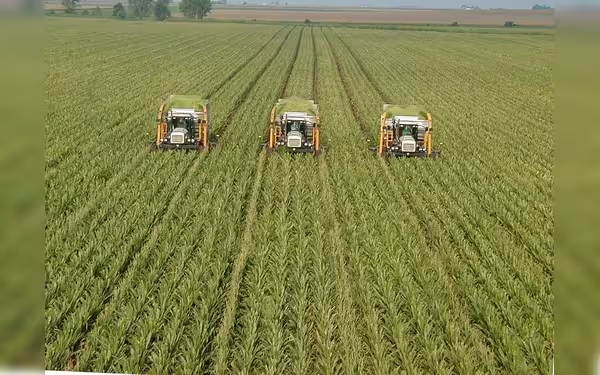Saturday, November 16, 2024 07:28 PM
Agricultural Crisis in Pakistan: Policy Failures and Flood Impact
- Farmers reconsider wheat planting strategies amid government neglect.
- Floods threaten food security and erode farmer confidence.
- Urgent policy measures needed to support agriculture recovery.
 Image Credits: tribune.com.pk
Image Credits: tribune.com.pkPakistan's agriculture faces a crisis due to policy failures and floods, threatening food security and farmer livelihoods.
Pakistan's agricultural sector has long been a cornerstone of its economy, contributing significantly to the nation’s GDP and providing livelihoods for millions. However, recent events have cast a shadow over this vital industry. The fiscal year 2023-24 began with hopes of recovery and growth, but heavy monsoon rains and flood-like conditions have disrupted farming activities across various regions. These weather challenges are not just a natural disaster; they are a wake-up call for policymakers and farmers alike.
Farmers, who are the backbone of the agricultural economy, are now facing tough decisions. With the Punjab government failing to procure last season's wheat, many growers are reconsidering their planting strategies. The abandonment by the government has left farmers feeling unsupported and uncertain about their future. As a result, there is a growing trend among farmers to reduce the area sown to wheat this fiscal year. This decision could have long-term implications for food security in the country.
The situation is further complicated by the fact that wheat is a staple food in Pakistan. A decrease in wheat production could lead to higher prices and increased food scarcity, affecting not just farmers but consumers across the nation. The government's failure to implement effective procurement policies has created a ripple effect that threatens the entire agricultural framework.
Moreover, the recent floods have not only damaged crops but have also eroded the confidence of farmers in government support. Many are left wondering if they can rely on the authorities to assist them during such crises. This lack of trust can lead to a decline in agricultural productivity, as farmers may hesitate to invest in their fields, fearing that their efforts will go unrewarded.
The current challenges facing Pakistan's agricultural sector highlight the urgent need for effective policy measures and support systems. It is crucial for the government to step up and provide the necessary assistance to farmers, ensuring that they can recover from the recent setbacks. By fostering a supportive environment, the government can help secure the future of agriculture in Pakistan, ultimately benefiting the entire nation. The time for action is now, as the health of the agricultural economy is not just a matter of policy; it is a matter of survival for millions of people.













